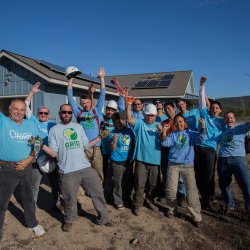As the sun rises over the thick morning fog, the sky clears to crystal blue, exposing the abundant forests and waters of the Columbia River Plateau in Eastern Washington. The ancestral lands of the Spokane Indians extends to the horizon in every direction, at one time encompassing over three million acres. Federal Indian Policy created the Spokane Indian reservation in 1881, reducing the Tribe's historic land base to its current 154,000 acres.
The Spokane Tribe, like many Tribal Nations, continues to face complex social, economic and environmental issues. Despite these many acute challenges, the Spokane Tribe of Indians are successfully developing long term solutions in their community. Their success thus far is a testament to their resilience, strength of cultural heritage, sovereignty, and vision. The tribe has big plans for tackling these future challenges through renewable energy and solar. One particular strategy is to train local tribal members and eventually form their own tribal enterprise—Sovereign Power.
In October of 2015 The Spokane Indian Housing Authority took a big step towards its goal by collaborating with GRID Alternatives and the Make it Right Foundation and installing four grid-tied residential photovoltaic (PV) systems in a housing development built for families who are below 60% of the national average median income.
The initiative provided hands-on experience in grid-tied solar PV installation to tribal and community members. The installation also complemented a week-long classroom-based solar PV curriculum taught by Solar Energy International that was offered at the Spokane Indian Housing Authority.
The collaboration with GRID Alternatives aligns with the Spokane Tribe of Indians Sustainable Community Master Plan, which was adopted in 2013 and builds upon successful tribal housing programs related to improving the energy efficiency of housing on the Spokane Indian Reservation.
Tribal member Stephen Tsoodle manages the Spokane Indian Housing Authority's Weatherization Program. He is a certified Building Analyst through the Building Performance Institute and is dedicated to improving the energy efficiency of existing housing stock to help provide energy savings for homeowners.
The hands on experience with GRID Alternatives provided Stephen with an opportunity to advance his technical knowledge related to renewable energy, enabling him to help the Spokane Housing Authority take the next step in providing savings for low income families by integrating solar PV systems in their development plans.
"I think it’s a pretty good program and the trainers are really descriptive and precise at explaining what needs to be done and why things need to be done," Stephen commented. "I believe the systems will really help out our tribe, especially the low income families. These systems are pretty straightforward to install and many tribal members could get jobs."
Jesse Ramos, who works in the weatherization department with Stephen described his experience with GRID Alternatives and the Spokane Indian Housing Authority and the possibilities it has for the tribe.
"I've always been interested in solar energy. I didn't know anything about it. Now that I got to do some book work on it and get some hands on experience it's really awesome. We never get opportunity like this around here. It's really positive for the rez that's for sure. If we could get more of these it would be great for everyone, more jobs, and lower bills."
As a result of the success of this collaboration, the Spokane tribe hopes to use the experience to develop more solar PV projects on its reservation and throughout the region.

